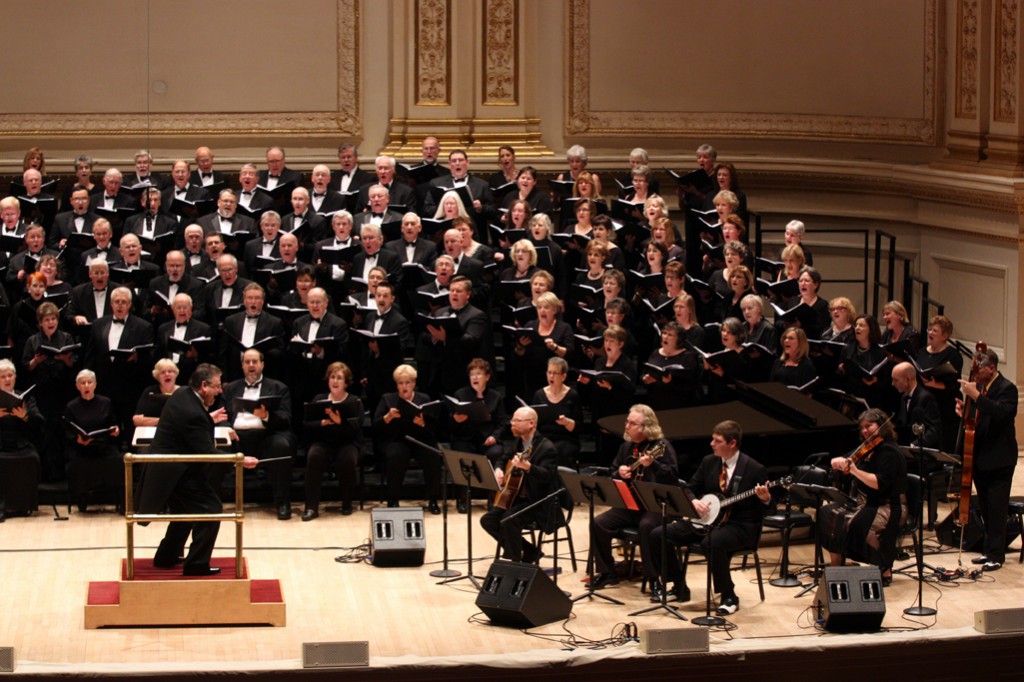Distinguished Concerts International New York (DCINY) presents Go Sing it on the Mountain
Distinguished Concerts Orchestra, Distinguished Concert Singers International, Pennsbury High School Concert Choir
James D. Moyer, director; Pepper Choplin, composer/conductor
Julianna Massielo, soprano; Ethan Barr, baritone; James T. Moyer, baritone; David Enlow, organist; Emily Drennan, soprano
Alice Tully Hall, Lincoln Center, New York, NY
November 28, 2016
‘Tis the season! With throngs of eager shoppers being coaxed into action by the myriad sales and specials that many stores are offering, it is a time of frantic activity that can try the hardiest of souls. As an antidote to this, Distinguished Concerts International New York (DCINY) offered a concert entitled Go Sing it on the Mountain, on November 28, 2016 at Alice Tully Hall. Consisting of two works, the much-loved Requiem from Gabriel Fauré, and the New York premiere of Go Sing it on the Mountain by DCINY favorite Pepper Choplin. With singers from North Carolina, Connecticut, Indiana, Ohio, Pennsylvania, and Washington, it was a concert to re-charge the weary soul.
James D. Moyer took the podium to conduct the Fauré Requiem. As I wrote in an earlier performance (June 7, 2015) about the Requiem: “Fauré began writing the Requiem in 1877, but did not complete it in its final orchestration until 1900. One of the best-loved works in this form, Fauré’s vision of death as a ‘happy deliverance…rather than a mournful passing,’ did not find favor with his employers at La Madeleine, one of the largest churches in Paris. One of the clerics there tartly remarked, “Monsieur Fauré, we do not need these novelties. The Madeleine’s repertoire is quite rich enough.” No doubt his omission of the fearful Dies Irae, the core of the Latin requiem mass, had something to do with this remark. One can say that Fauré won in the end, as this serene work continues to enchant listeners with its beauty.”
Tonight’s performance was a version for organ and chorus, with the excellent David Enlow at the Tully Hall organ, and the talented Pennsbury High School Choir from Pennsylvania. I was curious to see how these sixty-eight young singers were going to fare, due to what I (and many others) believe is a less than ideal hall acoustically (even after renovations to address this issue). It does appeared that the Tully Hall organ fared well, with what seemed increased heft in the lower register.
The three soloists (baritones Ethan Barr and James T. Moyer, and soprano Julianna Massielo) all delivered commendable performances, with kudos for Mr. Barr for keeping his focus when his solo became a “duet” with a toddler, whose screaming nearly drowned out everything. Kudos also to Mr. Moyer and Ms. Massielo, whose voices projected quite well. Mr. Enlow gave an outstanding performance.
While there were some minor issues with intonation and ensemble, the chorus was up to the challenge, and captured the essence of the work, saving the best for the last in the sublime In Paradisum. The audience was filled with supporters, and they gave their stars a loud and long ovation, that continued even as the stage was nearly empty. It was something that this sometimes jaded reviewer found touching. Well done, Pennsbury High School Choir and Mr. Moyer!
After intermission, the ebullient Pepper Choplin took the podium to conduct his work Go Sing it on the Mountain. Following the mountain theme, Go Sing it on the Mountain is a nine-movement work that uses folk tunes to tell the Christmas story (for the texts click here: Program Notes ). Some of the tunes use new texts devised by Mr. Choplin, while others use varying techniques (multi-layering of voices, combining melodies, etc.) to great effect. Each movement is preceded by a narrative written by the composer. Mr. Choplin is a man of deep faith, and his work is a natural expression of this. This reviewer has the utmost admiration for Mr. Choplin’s strength of mission, especially in a world today that often scorns or is outright hostile to such a stance.
One must also acknowledge the narrators, who were uncredited in the program notes, for their passionate readings. While these readings add luster, they could be set aside for non-secular sensitivities without any loss of the glory of the music.
Soprano soloist Emily Drennan, whom I had the pleasure of hearing in an earlier performance of Mr. Choplin’s song Circle of Love (A DCINY concert entitled Bluegrass57@7 on February 18, 2013), was delightful with her passionate delivery throughout. Her voice is ideal for these pieces, from the child-like innocence of A Child is Gonna Come, to the unbridled joy of Go Sing it on the Mountain, but she saved her best for Star Eternal, which soared to the heavens.
Highlights for this listener included the rousing opening movement Rise, O People and Bring Good News, the simple beauty of Call His Name Jesus, and the Appalachian-tinged Angel Band. Go Sing it on the Mountain is a welcome addition to the Christmas repertoire.
After the jubilant last words of the final movement Joyous Nowell to the World rang out with “The Lord has come!” the large audience rose to give Mr. Choplin a well-earned standing ovation. It was a fitting end to the evening.


